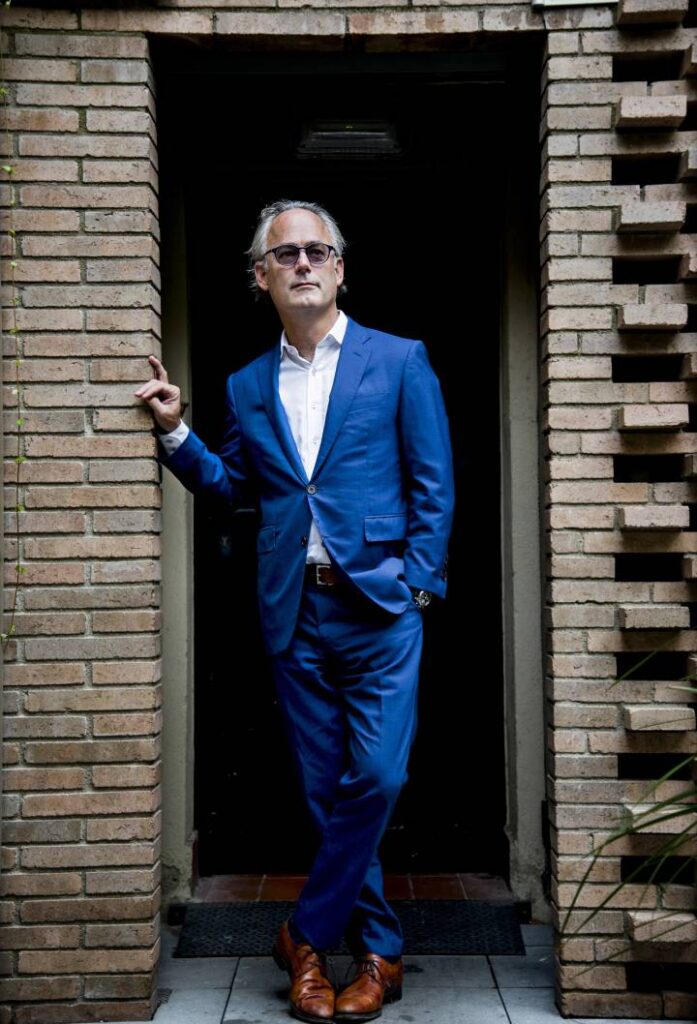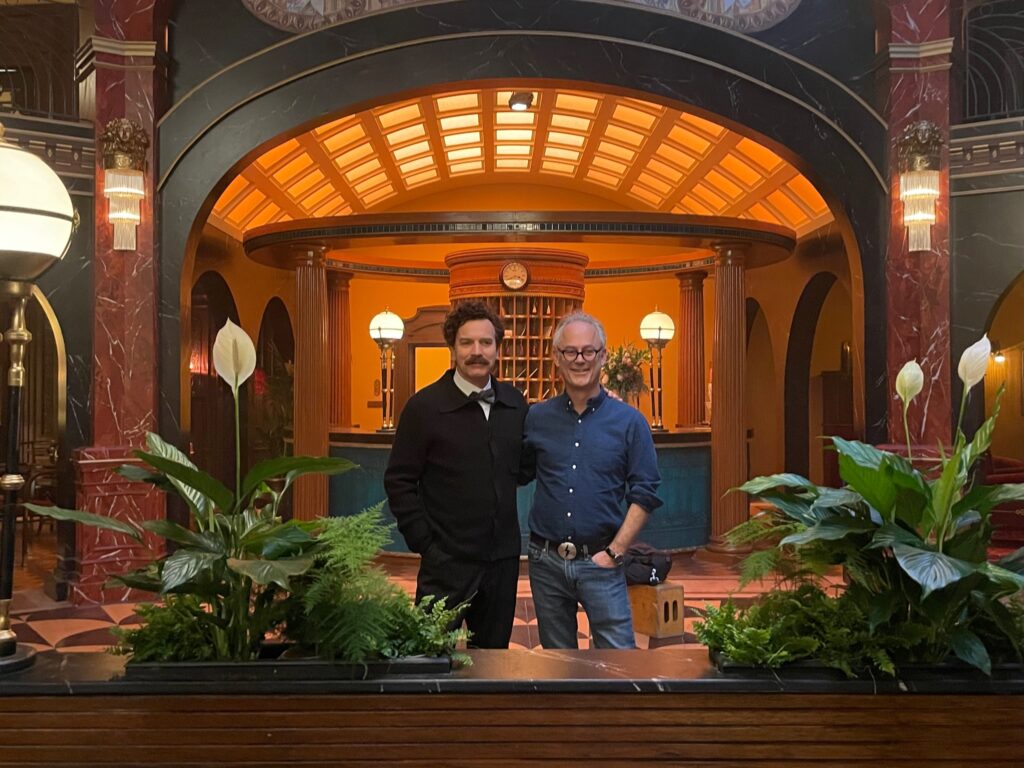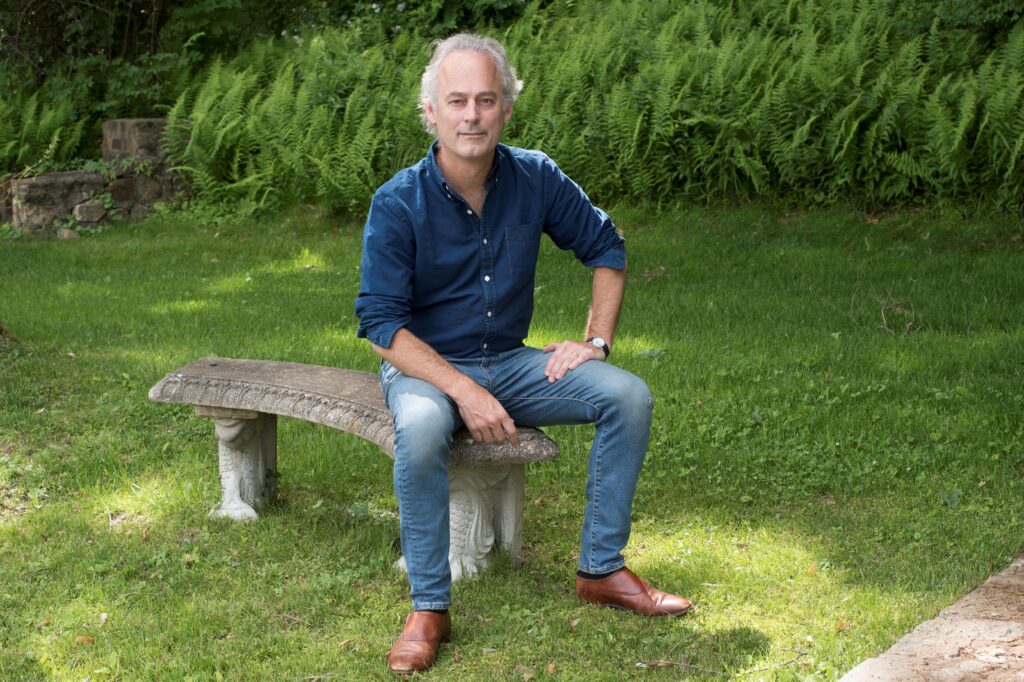Writer Amor Towles is a New York treasure. As his new tome, Table for Two, hits shelves, Towles invites TED HILDNER to his Gramercy Park home to discuss the art of storytelling

Author Amor Towles photographed in New York City by Roser Ninot
Since the debut of his first novel, Rules of Civility, which was hailed as one of the best books of 2011 by the Wall Street Journal, Amor Towles has swiftly become one of America’s favorite storytellers. After two decades on Wall Street, the banker turned best-selling author has emerged as a modern literary giant. Earlier this month, after already publishing three acclaimed novels, selling over six million copies, and having his second book, A Gentleman in Moscow, become an eight-part Showtime series starring Ewan McGregor (that he is also an executive producer on), Towles is enjoying the early success of his newest book, Table for Two, which many say is his best work yet—with the New York Times simply calling it “a winner.”
Table for Two is a page-turning collection of six short stories that take place in turn-of-the-
century New York, as well as a noir novella. “Eve in Hollywood,” the novella, is set in Los Angeles and follows Eve Ross, a main character from Rules of Civility who disappears from New York and ends up in Los Angeles in a mysterious web of lost souls, blackmail, and thugs. The half dozen other short stories offer windows into the lives of various characters, from the opportunistic Russian peasant who manipulates the surplus lines and creates capitalistic prosperity, to the unassuming elderly patron at Carnegie Hall who bootlegs concerts. Towles introduces us to an aspiring writer who spends more time forging art than creating fiction. The most unnerving is the nightmare tale of two airline passengers who, when grounded, share a hotel room. After one passenger’s drinking problem becomes larger than his carry-on baggage, all hell breaks loose.

Actor Ewan McGregor and Towles on the set of “A Gentleman in Moscow”
In Rules of Civility, which landed Towles on the bestseller list, he presented us with Eve Ross’s best friend, 25-year-old Katey Kontent, an ambitious young secretary from Brooklyn desperate to carve out a better life while climbing the treacherous corporate and social ladders in Depression-era Manhattan. After meeting a handsome banker named Tinker Grey, Katey, the novel’s narrator, gains access to the hallowed halls of Condé Nast and the smoke-filled, gin-soaked private parlors of the upper crust. Katey leaves a wake of chaos and destruction as she blazes through high society, but, despite her foibles and flaws, Towles renders her so lovingly and so human that it’s impossible not to love her.
Following the success of Rules of Civility, his second novel, 2016’s A Gentleman in Moscow, spent two years on the New York Times bestseller list, while The Lincoln Highway shot up to number one. Towles has been fascinated by Russian culture for decades and A Gentleman in Moscow is the oft-ironic tale of Count Alexander Ilyich Rostov, a Russian aristocrat held hostage inside the luxurious Metropol hotel in the early days of the Bolshevik Revolution. Over the next 30 years, as his freedom and the Russia he once loved vanishes, we follow the Count on an endearing, historical, and personal journey. Speeding ahead, The Lincoln Highway drives readers in a completely different direction. Full of thieves, misfits, and outrageous situations, The Lincoln Highway is a 10-day road trip, set in 1954, from Nebraska to the Adirondack Mountains, mapped with wrong turns and run-ins with hobos, nuns, and punch-throwing bullies.
“His second novel, 2016’s A Gentleman in Moscow, spent two years on the New York Times bestseller list, while The Lincoln Highway shot up to number one.”
I sat down with New York’s hometown literary hero in the garden of his Gramercy Park town house on the morning it was announced that Warner Bros. had picked up The Lincoln Highway to become a feature film written and directed by Christopher Storer, the creator of the multi-award-winning series The Bear. A laid-back, affable Towles met me at the front door with a wide smile. In his sporty, middle-aged preppy look, horned-rimmed glasses perched on his nose, Towles welcomed me in, offered me something to drink, and walked me through his impressive four-story home. It felt as though I was stopping by an old friend’s place for a cocktail rather than a formal interview. Huddled at the table where his family eats—and many of his characters were created—Towles was eager to discuss his unique writing process and reveal a few stories behind the man who pens the stories the world can’t seem to get enough of.

O magazine praised Towles’ first novel as “an irresistible and astonishingly assured debut,” but his seemingly overnight success resulted from years of hard work and a lifetime passion for learning. When did Towles first know he wanted to write? Without hesitation, he says, “I got interested in writing fiction, really, when I began reading. I was in first grade, and my teacher in Dedham, Massachusetts, invited a poet with some reputation in the Boston area to come in and read to our class.” The poet was Harvard’s award-winning David McCord. “He read poetry targeted at young people. I loved everything about it. I liked the effect the poems had on all of us in the group.” That night, first-grader Towles went home with his signed copy of McCord’s tome and began his writing career by crafting poems on ice cream and other subjects a young kid found highly important.
Throughout high school and college, Towles continued to write fiction. Two encounters at Yale during his undergraduate years changed the course of his life. He met Peter Matthiessen and Walter Abish, two completely different types of writers. Towles says they “taught me how to begin to see the many other elements of craft that are involved in constructing a novel and the importance of learning
other things from other people. Probably the most important mentor in my writing life was the great Peter Matthiessen, who was both a novelist and a naturalist and an essayist and founded The Paris Review with George Plimpton in the ’50s.” Matthiessen, who taught a writing seminar that you had to apply to get into, accepted Towles and, after just a matter of weeks, approached the student and told him he saw greatness in his abilities and that if he were serious about becoming a writer, he would help him achieve his dream. Towles will never forget this pivotal moment, the first time someone he truly respected believed in him, giving him the confidence to thus believe in himself—something he says every artist needs, but few get.
It was also at Yale that, during a writing seminar his sophomore year, he met visiting professor Walter Abish. “Abish lived in the Village and was a real hardcore experimentalist. Born in Austria [just before] the Second World War, he had an eye patch and was really a wild guy. I’m not kidding about that. He made a big impact on me.” Abish compiled a list of 100 books he believed everyone interested in becoming a writer should read. “That list became an obsession for me. I would go to used bookstores wherever I was with the list, and I’d hunt. Some of it was mainstream, but a lot of the stuff wasn’t in print anymore. Slowly, I found all the books and would stack them up.” Towles headed to his family’s house in Martha’s Vineyard that summer and began reading, sometimes a book a day, until he finished the list.
After Yale, Towles attended Stanford University, where, upon graduating in 1989, his senior thesis, The Temptations of the Pleasure, a collection of short stories, was published in The Paris Review. With a master’s in English, he moved to New York and tried his hand at becoming a professional writer but was pulled away by the prospect of a lucrative career on Wall Street. He helped build Select Equity Group into a firm that now manages over $35 billion in assets. But while he excelled in finance, he never lost his dream about being a writer. In what little spare time he had, Towles crafted stories and, after numerous attempts at a manuscript, he sold his first novel, Rules of Civility, in 2011.
Towles ditched the pressure cooker of Wall Street two years later and has been writing full time ever since. Although he loves working from home, becoming the man that millions of admiring readers have come to love isn’t easy. His standards are sky-high, and his books are complex puzzles filled with depth, detail, and historical accuracy. He follows an arduously strict process with every project. “It takes me a long time to write a book. I can spend years creating the outline, detailing the characters, plots, and settings. I do this for each chapter until I get to the end, and I don’t begin to really write until I’m satisfied. I’ll ultimately try to imagine everything that will happen in the book well in advance. After I write my first draft, I usually
revise it three times from beginning to end.”
When queried about what’s next, Towles happily reports he’s currently working on a new novel. “It’ll take me a couple of years to do, but it starts in Cairo after the Second World War and ends in New York City in 1999. I’m well into it, but not even halfway through.” We can already hear Hollywood ready to start a bidding war before the book is even finished.

Amor Towles

